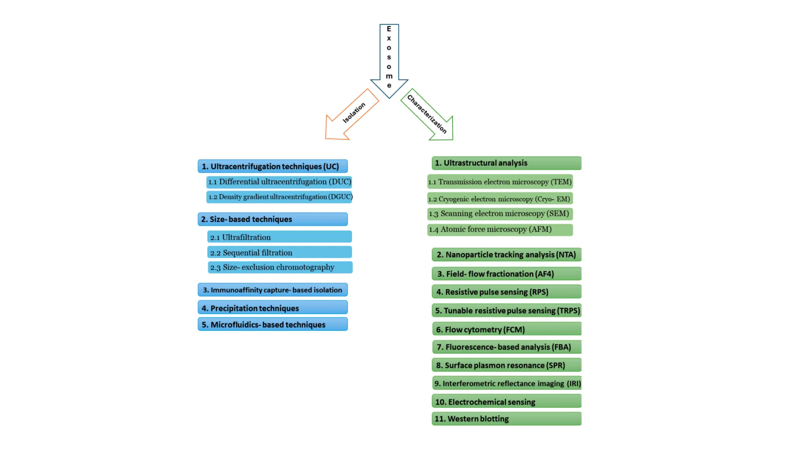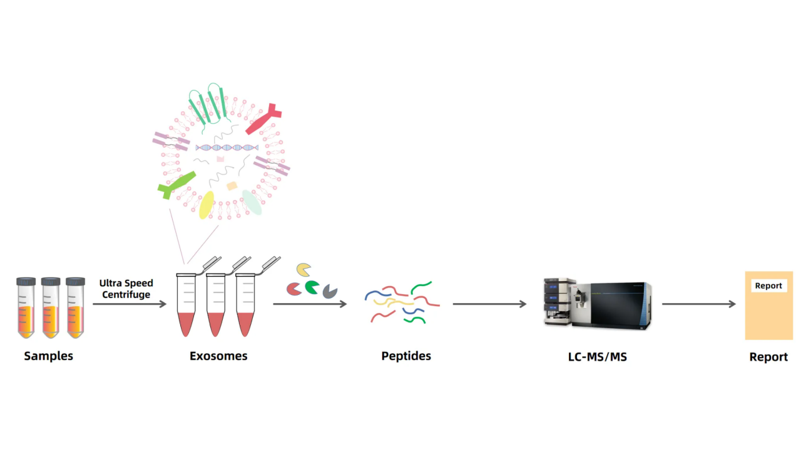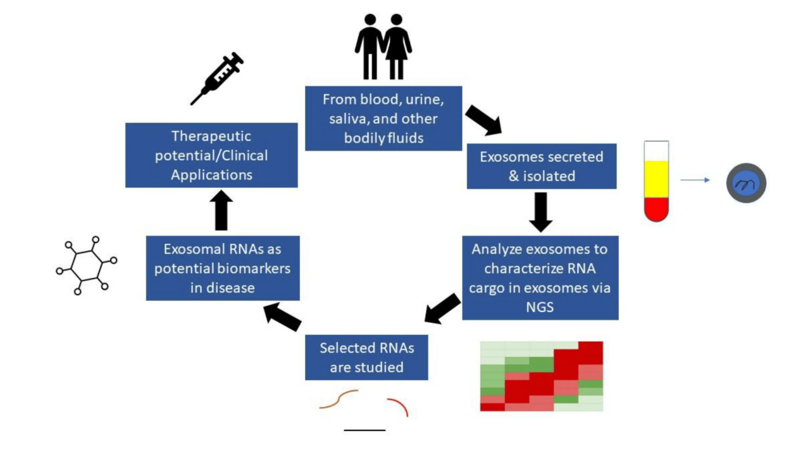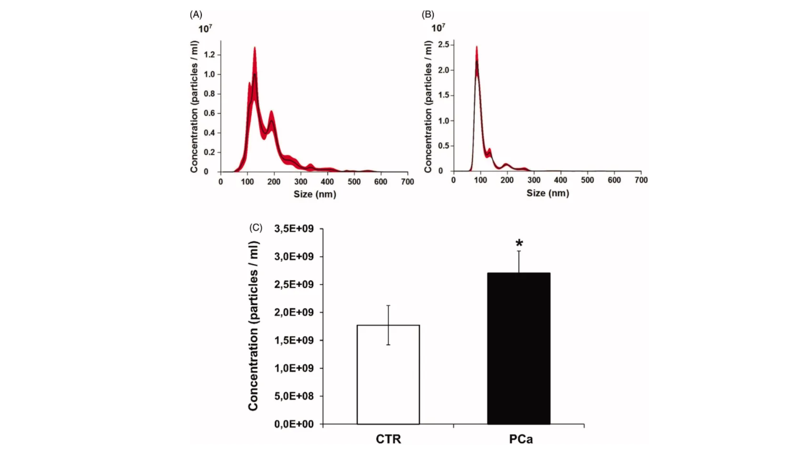Exosome Profiling
- Nanoparticle Tracking Analysis-based Exosome Characterization Service
- Transmission Electron Microscope (TEM) based Exosome Characterization Service
- Mass Spectrometry based Exosome Characterization Service
- Tunable Resistive Pulse Sensing (TRPS) based Exosome Characterization Service
- Exosomal Surface Marker-based Exosome Characterization Service
- FACS based Exosome Characterization Service
- Western Blotting based Exosome Characterization Service
- Nano-Flow Cytometry (nFCM) Service
- Microenvironment Analysis: Elucidate exosome-mediated signaling in disease progression (e.g., cancer, neurodegeneration, immune disorders).
- Biomarker Discovery: Identify exosome-specific markers correlated with disease stages and prognosis, offering vital functional clues.
- Non-invasive Liquid Biopsy: Develop early screening and disease classification tools from exosomal molecular profiles in blood and urine.
- Therapeutic Monitoring: Track changes in exosome markers during treatment to assess drug response and resistance evolution.
- Delivery Vehicle Design: Analyze natural exosome targeting properties to guide engineered drug carriers.
- Target Validation: Identify and validate exosome-derived pathological targets to accelerate novel therapies.
- Subpopulation Analysis: Characterize molecular diversity among patient-derived exosome subtypes to guide personalized therapies.
- Prognostic Modeling: Integrate multi-omics data to build exosome-based prediction models for clinical outcomes and stratified patient management.
- Isolated Exosomes: ≥200 μg total protein or ≥100 μL in PBS
- Plasma/Serum: ≥2 mL per sample
- Cell Culture Supernatants: ≥5 mL per sample
- Other Body Fluids: Please inquire for specific requirements
Exosomes are small, membrane-bound vesicles secreted by most cell types. They play critical roles in intercellular communication by transporting proteins, lipids, RNAs, and other bioactive molecules between cells. Exosomes are involved in numerous physiological and pathological processes, including immune modulation, tissue repair, and cancer progression, which has garnered significant attention in biomedical research.
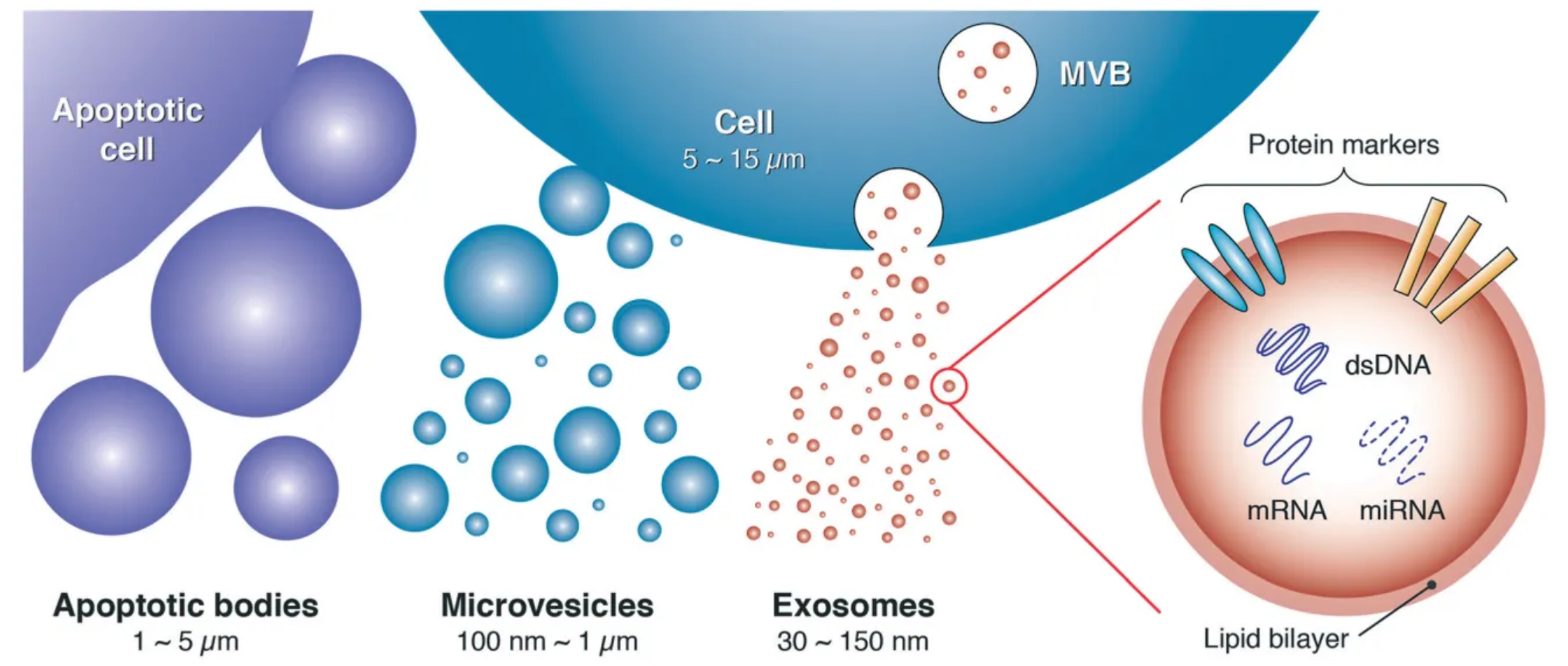
Contreras-Naranjo, J. C. et al. Lab Chip. 2017.
In recent years, exosome profiling has become a powerful tool for understanding disease mechanisms, discovering biomarkers, and developing new therapeutic strategies. These vesicles serve as valuable sources of information about the cellular state of the parent cell and can reflect pathological changes within tissues or organs. Thus, exosomes are being increasingly utilized in liquid biopsy applications, offering a non-invasive method to monitor diseases like cancer, neurodegenerative diseases, and cardiovascular disorders.
Services at MtoZ Biolabs
MtoZ Biolabs provides comprehensive Exosome Profiling Services to support a wide range of biomedical research and translational applications. Our services are designed to capture the molecular complexity of exosomes across multiple dimensions, offering deep insights into their biological roles and diagnostic potential. We perform detailed exosome characterization, quantitative analysis, and multi-omics profiling, including proteomics, transcriptomics, and genomic content analysis. These capabilities allow us to reveal exosome composition, identify bioactive cargo, and uncover mechanisms of intercellular communication in both physiological and pathological contexts.
Analysis Workflow
1. Sample Preparation and Exosome Isolation
Biological samples such as plasma, serum, urine, cell culture supernatants, or tissues are collected and processed under optimized conditions. Exosomes are isolated using ultracentrifugation, size exclusion chromatography, or immunoaffinity-based enrichment methods.
2. Exosome Characterization
The isolated exosomes are characterized for size distribution, morphology, and surface markers using nanoparticle tracking analysis (NTA), transmission electron microscopy (TEM), and western blot or flow cytometry.
3. Exosome Quantification
Quantification of exosomes is performed using MRI, NTA or ELISA-based methods to assess vesicle concentration and support comparative studies across conditions.
4. Exosomal Cargo Extraction
RNA, DNA, proteins, and metabolites are extracted from purified exosomes using validated kits and protocols to preserve integrity and yield.
5. Omics-Based Profiling
Exosomal RNA-seq, proteomics, and metabolomics are conducted to uncover molecular content and biological signatures. High-resolution LC-MS/MS and NGS platforms are employed for in-depth analysis.
6. Data Processing and Bioinformatics
Raw data are processed through standardized pipelines. Bioinformatic analyses include differential expression, pathway enrichment, and network modeling to reveal functional implications.
7. Report Delivery
A comprehensive report is provided including methodology, quality control metrics, raw and processed data, and annotated bioinformatics results tailored to the research objectives.
Why Choose MtoZ Biolabs?
☑️Advanced Platforms: We utilize state-of-the-art technologies including ultracentrifugation, NTA, LC-MS/MS, and RNA-seq platforms to ensure comprehensive and accurate exosome profiling.
☑️One-Stop Solutions: From isolation to multi-omics analysis and bioinformatics interpretation, we offer fully integrated services tailored to your research goals.
☑️Experienced Team: Our scientists specialize in exosome biology and omics technologies, providing expert guidance and quality assurance at every stage.
☑️Customizable Workflows: We adapt protocols based on sample type, target molecules, and analytical objectives to ensure high relevance and reproducibility.
☑️Reliable Deliverables: Each project is completed with detailed documentation, high-quality data, and clear interpretation to support downstream applications.
Applications
Exosomes, as critical mediators of intercellular communication, offer vast applications in biomedical research and clinical translation. Our Exosome Profiling Service delivers systematic and high-sensitivity analysis for key areas:
1. Disease Mechanism and Pathology Research
2. Clinical Diagnosis and Health Monitoring
3. Drug Development and Therapeutic Exploration
4. Precision and Personalized Medicine
Sample Submission Suggestions
We accept the following sample types:
Samples should be stored at -80°C and shipped on dry ice. Avoid repeated freeze–thaw cycles.
*Please consult us for tailored collection and storage protocols to maximize data quality.
Deliverables
1. Experimental report outlining study design and methodology
2. Exosome characterization data (NTA, TEM, Western blot, etc.)
3. Raw and processed data from in vitro/in vivo assays
4. Molecular profiling results (if applicable)
5. Bioinformatics summary and statistical analyses
If you are interested in our Exosome Profiling Service, please feel free to contact us. Our technical specialists are available to provide a free business assessment.
How to order?







